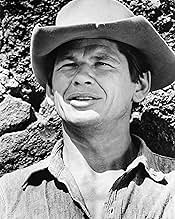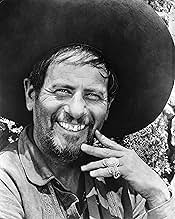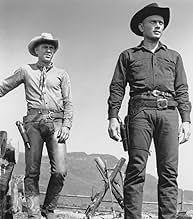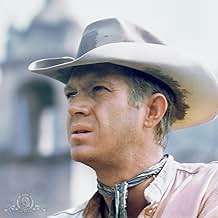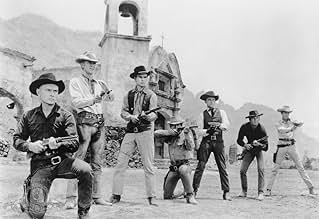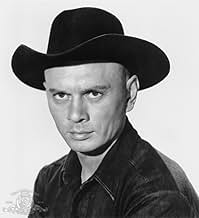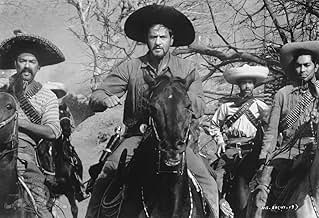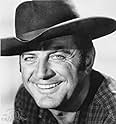Seven gunfighters are hired by Mexican peasants to liberate their village from oppressive bandits.Seven gunfighters are hired by Mexican peasants to liberate their village from oppressive bandits.Seven gunfighters are hired by Mexican peasants to liberate their village from oppressive bandits.
- Nominated for 1 Oscar
- 2 wins & 6 nominations total
Jorge Martínez de Hoyos
- Hilario
- (as Jorge Martinez de Hoyas)
Natividad Vacío
- Villager
- (as Natividad Vacio)
John A. Alonzo
- Miguel
- (as John Alonso)
Summary
Reviewers say 'The Magnificent Seven' has a strong cast, including Yul Brynner and Steve McQueen, and an iconic score. But it's seen as less profound and more formulaic than 'Seven Samurai', which it's a remake of. The Western setting and Hollywood production style differentiate it from the more culturally specific and artistically driven original.
Featured reviews
I saw this film umpteenth number of times in the late 80s n early 90s on a VHS. Revisited it recently on a DVD after watching the remake (Denzel Washington one). Well this movie itself is a western remake of Kurosawa's Seven Samurai. As a fan of western films n being a big fan of Mcqueen, i enjoyed it more than Seven Samurai. The film is an engaging n adventurous western, awesomely directed by John Sturges. The story is simple, poor farmers hire seven gunslingers to protect them from a small army of bandits.
Yul Brynner is full of attitude n terrific as the leader of the seven. Steve McQueen really shines as the right-hand man. Charlie Bronson in his leanest physique wearing a stylish full sleeves tshirt n denim shirt. James Coburn is cool but very deadly with his knife than guns. His body language speaking louder than any of his lines. Robert Vaughn as the man who loves to live life king size n who's fightin his inner demons. Brad Dexter is the big muscular guy with a good sense of humour. And then there is Eli Wallach as the bandit leader. Watch out for Wallach's statement on generosity. The film has a lot of great scenes involving the action and shootouts that is engaging to watch. The Magnificent Seven is not complete without mentioning Elmer Bernstein's legendary score.
Yul Brynner is full of attitude n terrific as the leader of the seven. Steve McQueen really shines as the right-hand man. Charlie Bronson in his leanest physique wearing a stylish full sleeves tshirt n denim shirt. James Coburn is cool but very deadly with his knife than guns. His body language speaking louder than any of his lines. Robert Vaughn as the man who loves to live life king size n who's fightin his inner demons. Brad Dexter is the big muscular guy with a good sense of humour. And then there is Eli Wallach as the bandit leader. Watch out for Wallach's statement on generosity. The film has a lot of great scenes involving the action and shootouts that is engaging to watch. The Magnificent Seven is not complete without mentioning Elmer Bernstein's legendary score.
I first saw this film about 20 years ago as a teenager and I still find it as enjoyable now as I did then. It is the tale of seven gunfighters who are hired by a poor Mexican farming community to help drive off the bandits who periodically show up and steal the communities food and goods. Of the Magnificent Seven most of the screen time is given to Chris (Brynner), Vin (McQueen) and Chico (Bucholz). While no details are given about the individual pasts of the Magnificent Seven it is fairly clear what there pasts may have been.
1. Chris: A leader, perhaps a former soldier, who has encountered danger before and gained a degree of mastery over his emotions in dangerous situation.
2. Vin: A capable man with a gun, perhaps a one time cowboy. He seems to be comfortable working as a loner but clearly would like to one day settle down.
3. Chico: The youngest of the Seven and most inexperienced. He wants to shed his farming past and attempts through acts of bravado to persuade others and himself that he is a gunfighter at heart.
4. Bernardo (Bronson): A strong solitary man that in many ways resembles Chris although not displaying the desire to lead. In many ways he is the most interesting character. He has made quite a bit of money in the past even though he is now broke. The attention he gives to the local village children and the gift he gives a village girl hint at the idea that while he is good at gunfighting he knows that it is a good family life that is important.
5. Lee (Vaughn): The most difficult character to relate to. He appears to be a gunman who in the past was cocky, arrogant and self assured but now after experiencing life on the run now doubts himself. He wants to do the right thing but finds it difficult to step up to the plate when it's his turn.
6. Britt (Coburn): A loner who is unequaled in a gun or knife fight. A man whose motives remain his own.
7. Harry (Dexter): A good man to have in a fight but one who lets greed cloud his every decision. It would seem that Harry is one of those individuals who is always one step away from gaining riches but somehow never gains them.
The leader of the bandits is Calvera (Walsh) who is not an unlikeable fellow. He appears to believe that it is his job to steal so that he can support himself and his men. For him it is only a job, not unlike the farmers who work the land to provide for their families. He has what can almost be describes as a code of ethics for those who make their living with guns. This code of ethics is evident in the way he treats the Magnificent Seven towards the end of the film. However, given the films ending, this code does not seem to be shared by the Magnificent Seven
Lastly, while many people may view this film as a western action film I think there is quite a bit of underlying humanity and character depth woven into the story. It is these underlying characteristics that distinguish it from the average western action flick and have helped to make this film as popular as it is.
1. Chris: A leader, perhaps a former soldier, who has encountered danger before and gained a degree of mastery over his emotions in dangerous situation.
2. Vin: A capable man with a gun, perhaps a one time cowboy. He seems to be comfortable working as a loner but clearly would like to one day settle down.
3. Chico: The youngest of the Seven and most inexperienced. He wants to shed his farming past and attempts through acts of bravado to persuade others and himself that he is a gunfighter at heart.
4. Bernardo (Bronson): A strong solitary man that in many ways resembles Chris although not displaying the desire to lead. In many ways he is the most interesting character. He has made quite a bit of money in the past even though he is now broke. The attention he gives to the local village children and the gift he gives a village girl hint at the idea that while he is good at gunfighting he knows that it is a good family life that is important.
5. Lee (Vaughn): The most difficult character to relate to. He appears to be a gunman who in the past was cocky, arrogant and self assured but now after experiencing life on the run now doubts himself. He wants to do the right thing but finds it difficult to step up to the plate when it's his turn.
6. Britt (Coburn): A loner who is unequaled in a gun or knife fight. A man whose motives remain his own.
7. Harry (Dexter): A good man to have in a fight but one who lets greed cloud his every decision. It would seem that Harry is one of those individuals who is always one step away from gaining riches but somehow never gains them.
The leader of the bandits is Calvera (Walsh) who is not an unlikeable fellow. He appears to believe that it is his job to steal so that he can support himself and his men. For him it is only a job, not unlike the farmers who work the land to provide for their families. He has what can almost be describes as a code of ethics for those who make their living with guns. This code of ethics is evident in the way he treats the Magnificent Seven towards the end of the film. However, given the films ending, this code does not seem to be shared by the Magnificent Seven
Lastly, while many people may view this film as a western action film I think there is quite a bit of underlying humanity and character depth woven into the story. It is these underlying characteristics that distinguish it from the average western action flick and have helped to make this film as popular as it is.
Every year a Mexican bandit and his large gang of forty thieves harass and plunder a poor farming village south of the American border. They take what they need in provisions from the increasingly impoverished inhabitants. Deciding that enough means ENOUGH (and the wise old man in the village advises that it is DO or DIE), the village elders recruit gunmen from the US to defend them. The actual recruiting of six of the motley crew of gunslingers is done by top American gunman, the grim Chris Adams (Yul Brynner), dressed in black. The wages are only twenty dollars but chow is included, and it is good Mexican food (as the Americans discover). Each one of the defenders has his own reasons for volunteering, and not necessarily as a sense of doing the right thing (one of the men is a soldier of fortune). The men have various talents. For instance, one is a sharpshooter; another is handy with a knife. Much of the film is obviously a build-up to the final confrontation between the "good guys" and the banditos.
Outside of the rousing action-packed sequences, this movie has four merits: the actors, the cinematography, Elmer Bernstein's Oscar-nominated music score, and the on-location filming in Mexico. Stars and future stars like Yul Brynner, Charles Bronson, Steve Mc Queen, Robert Vaughn, and James Coburn do not disappoint. Eli Wallach, the future "Tuco," stars as an appropriate pitiless Mexican leader Calvera, who is not without his own concerns. Of course, with so many personalities, actors "battle" for screen time. There is an underlying message in this movie (and in subsequent remakes) that is overlooked: Mexico was a place of anarchy where the federal government could not always keep law and order.
John Sturges' western was lifted from Akira Kurosawa's "Seven Samurai" (1954), perhaps the greatest movie ever filmed in Japan. In this original version, seven unemployed samurai swordsmen are also hired to fight bandits who terrorize a village. But Kurosawa made a superior film showing the importance of the code of honor of the defenders along with their three-dimensional character development (the film's length was much longer). He even showed a sketch of the Japanese village and the name (or symbols) of each of the bad guys. So when one of them was bumped off, one of the samurai would cross off his name from the bandit list. This helps the audience understand the defensive strategy and what was happening in the battles as the number of the bandits diminished.
Nevertheless, "The Magnificent Seven" does stand on its own merits in the heyday of American westerns as a very good movie to enjoy. Even though the pacing is slow, it remains worthwhile watching.
Outside of the rousing action-packed sequences, this movie has four merits: the actors, the cinematography, Elmer Bernstein's Oscar-nominated music score, and the on-location filming in Mexico. Stars and future stars like Yul Brynner, Charles Bronson, Steve Mc Queen, Robert Vaughn, and James Coburn do not disappoint. Eli Wallach, the future "Tuco," stars as an appropriate pitiless Mexican leader Calvera, who is not without his own concerns. Of course, with so many personalities, actors "battle" for screen time. There is an underlying message in this movie (and in subsequent remakes) that is overlooked: Mexico was a place of anarchy where the federal government could not always keep law and order.
John Sturges' western was lifted from Akira Kurosawa's "Seven Samurai" (1954), perhaps the greatest movie ever filmed in Japan. In this original version, seven unemployed samurai swordsmen are also hired to fight bandits who terrorize a village. But Kurosawa made a superior film showing the importance of the code of honor of the defenders along with their three-dimensional character development (the film's length was much longer). He even showed a sketch of the Japanese village and the name (or symbols) of each of the bad guys. So when one of them was bumped off, one of the samurai would cross off his name from the bandit list. This helps the audience understand the defensive strategy and what was happening in the battles as the number of the bandits diminished.
Nevertheless, "The Magnificent Seven" does stand on its own merits in the heyday of American westerns as a very good movie to enjoy. Even though the pacing is slow, it remains worthwhile watching.
I've seen both the American and Japanese versions many times, and while everyone agrees about which one is better, the American version has some virtues: 1) Our heroes are selected by the farmers when they defend a dead Indian's right to be buried in the same place as white people; therefore they are seen as champions of social and racial equality by the farmers. 2) A magnificent villain played by Eli Wallach. 3) Charlie Bronson's relationship with the village boys. And some tremendous faults: 1) Combining the Young Student and Crazy Fool characters; some of the most poignant scenes in the Japanese version involved the interaction between these two. 2) Not filming the final battle in the rain. And of course many more of each. It's an interesting discussion. Both are great movies that shouldn't be missed. Remember that Kurosawa gave John Sturges a sword in appreciation after seeing his film.
Based somewhat faithfully on the Akira Kurosawa classic Shichinin no samurai, The Magnificent Seven could be mistaken for just another of the many Westerns that were turned out in Hollywood during this era. But there is a certain something that keeps The Magnificent Seven unique. Part of it is the concept borrowed from the earlier Japanese film, but some of it lies in the attitude of the seven mercenaries referred to in the title.
Much is made here of the difference between fighting for money, fighting for justice, or fighting for a future. While this version of Kurosawa's epic contains all the philosophical leanings of the original, it isn't nearly as long-winded or languid. The downside to this is that it isn't nearly as moody or powerful. In fact, one can easily see the difference between American and foreign cinema simply by comparing Shichinin no samurai with The Magnificent Seven. One is incredibly dark and downbeat most of the time. The other mostly has a score that is so major it wouldn't sound out of place in Seven Brides For Seven Brothers.
Differences in feeling aside, the ultimate question is whether this version of the story manages to entertain. The hardest challenge any film faces is keeping the audience amused while all the exposition is laid out. Here, the exposition is kept to a minimum while carefully inserted between some fast-paced, albeit very mild action sequences.
Sometimes, the dialogue ("We deal in lead, friend.") gets incredibly stilted. Sometimes, it seems incredibly wise. Well, since we have examples of films where it's all stilted, all the time, we can forgive this one. The film also includes several textbook examples of how to include a sudden plot element without seeming contrived. When we learn why Calvera's men just won't go away, it needs no setup simply because it is consistent with their behaviour throughout the rest of the film.
In the end, The Magnificent Seven comes off as an excellent remake of a masterpiece. There are better Westerns out there, and there are better action films, but there aren't many. I gave it a nine out of ten. Go in expecting to be entertained, but little more, and you cannot go wrong.
Much is made here of the difference between fighting for money, fighting for justice, or fighting for a future. While this version of Kurosawa's epic contains all the philosophical leanings of the original, it isn't nearly as long-winded or languid. The downside to this is that it isn't nearly as moody or powerful. In fact, one can easily see the difference between American and foreign cinema simply by comparing Shichinin no samurai with The Magnificent Seven. One is incredibly dark and downbeat most of the time. The other mostly has a score that is so major it wouldn't sound out of place in Seven Brides For Seven Brothers.
Differences in feeling aside, the ultimate question is whether this version of the story manages to entertain. The hardest challenge any film faces is keeping the audience amused while all the exposition is laid out. Here, the exposition is kept to a minimum while carefully inserted between some fast-paced, albeit very mild action sequences.
Sometimes, the dialogue ("We deal in lead, friend.") gets incredibly stilted. Sometimes, it seems incredibly wise. Well, since we have examples of films where it's all stilted, all the time, we can forgive this one. The film also includes several textbook examples of how to include a sudden plot element without seeming contrived. When we learn why Calvera's men just won't go away, it needs no setup simply because it is consistent with their behaviour throughout the rest of the film.
In the end, The Magnificent Seven comes off as an excellent remake of a masterpiece. There are better Westerns out there, and there are better action films, but there aren't many. I gave it a nine out of ten. Go in expecting to be entertained, but little more, and you cannot go wrong.
Did you know
- TriviaAlthough the film received mixed reviews, Akira Kurosawa was so impressed he sent John Sturges a ceremonial sword as a gift.
- GoofsSteve McQueen wears Levi's jeans with the famous red tab, which were not introduced until the 1930s.
- Quotes
[Calvera has just captured the Seven]
Calvera: What I don't understand is why a man like you took the job in the first place, hmm? Why, huh?
Chris: I wonder myself.
Calvera: No, come on, come on, tell me why.
Vin: It's like a fellow I once knew in El Paso. One day, he just took all his clothes off and jumped in a mess of cactus. I asked him that same question, "Why?"
Calvera: And?
Vin: He said, "It seemed to be a good idea at the time."
- Crazy creditsAnd Introducing Horst Buchholz
- Alternate versionsThe German theatrical release differs from the German VHS video in the scene where the magnificent seven have been taken by surprise and have to put down their weapons on the table. Chico is the last one and stands in enragement. In the theatrical version he then nevertheless unstraps his belt like the others. In the VHS video version Chris jumps at Chico just in that moment when he wants to pull the gun. Chris takes his gun and puts it on desk. Then Chico unstraps his belt.
- ConnectionsFeatured in Precious Images (1986)
- SoundtracksThe Magnificent Seven Theme
Written by Elmer Bernstein
- How long is The Magnificent Seven?Powered by Alexa
Details
- Release date
- Country of origin
- Languages
- Also known as
- Siete hombres y un destino
- Filming locations
- Cuernavaca, Morelos, Mexico(desert, sets)
- Production companies
- See more company credits at IMDbPro
Box office
- Budget
- $2,000,000 (estimated)
- Gross worldwide
- $416
- Runtime
- 2h 8m(128 min)
- Color
- Sound mix
- Aspect ratio
- 2.35 : 1
Contribute to this page
Suggest an edit or add missing content


